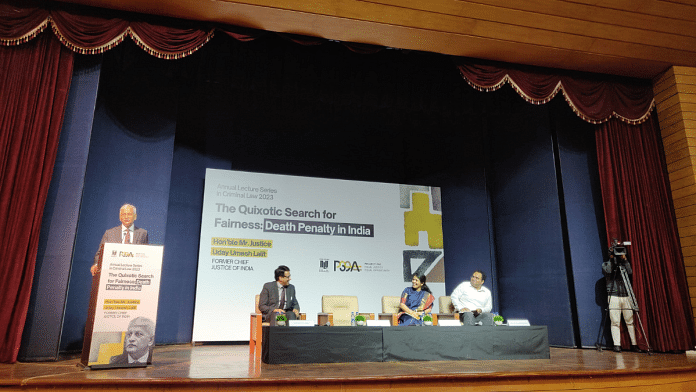New Delhi: Judges cannot abandon the death penalty when several laws expressly provide for it, former Supreme Court judge Justice U.U. Lalit said Saturday.
“We can’t just abandon and say that we will not grant the death sentence in any matter. Then what happens to those statutory intendment? This is something which our Parliament has come out with, our representatives…they have thought fit that these kinds of laws must be put in place, so therefore, one has to strive to have a balance between the two,” he said.
The former SC judge added: “At the back of your mind, it will always be a possibility that a death sentence can be awarded (but) that doesn’t mean it must be. Therefore, we try to find whether there are any circumstances which would justify the non-grant of the death sentence.”
Lalit was speaking at the 6th Annual Lecture in Criminal Law organised by Project 39A, the National Law University (NLU) Delhi’s criminal justice programme.
Answering a question from the audience on society’s perception of a death row convict, even after his death row gets commuted, the former judge highlighted the fact that India has been moving towards a situation where death sentences are granted in minimum cases by courts.
However, he drew attention towards the statutory developments, pointing out that the death sentence has been added as a punishment for several crimes through amendments by the Parliament.
“Every time, the societal demand or cry for justice also is that in certain matters death sentences be awarded. That’s the balance which the judiciary has to strike,” said Lalit.
Also Read: Are courts awarding too many death sentences? 539 convicts on death row in 2022, highest in 17 yrs
Key issues concerning ‘fairness’
During the lecture, Lalit spoke of the key issues concerning “fairness” at every stage of the criminal justice system, including arrest, investigation and prosecution, at the trial court, the high court, the Supreme Court, as well as at the execution stage.
“This is how the approach of the courts at every level is getting refined…only to see that the man who is facing the possibility of death sentence must be given adequate representation and every fair opportunity to represent himself,” he asserted.
According to Lalit, as a Supreme Court judge, of the at least 25 death sentence cases before him, he only confirmed capital punishment in two — one in the rape and murder case of a four-year-old and the other in the 2000 Red Fort attack case.
“In all other matters, the conscience of a judge must actually get satisfied to a very different level that this is where that light needs to be extinguished because that is a very extreme power which is given to a judge. Amongst fellow citizens, you are given the power to terminate the life of a fellow citizen,” he explained.
Lalit added: “And that power, therefore, the judges exercise with extreme caution and extreme circumspection.”
‘No excuse’
Justice Lalit began his lecture by speaking of several landmark judgments that have charted the course of death penalty jurisprudence in the country.
Referring to several cases, he then asserted that the Supreme Court is “seeing death sentence matters…death convicts with a different kind of compassionate idea”.
“It is not being seen as a pure run-of-the-mill matter. These matters are seen with special caution,” he said.
During his tenure as a Supreme Court judge, he also dealt with the death penalty in several cases.
Last year, he delivered a landmark judgment in Manoj vs The State of Madhya Pradesh, highlighting the importance of reformation in capital sentencing, and mandated jail conduct as well as psychological and psychiatric evaluation reports of the convict to assist the court in assessing reform.
The court suggested that the social milieu, age, educational levels, any trauma faced by the convict earlier in life, family circumstances, psychological evaluation of the convict, and post-conviction conduct were all relevant factors at the time of considering whether the death penalty ought to be imposed upon the accused.
The court, therefore, laid down guidelines for the collection of mitigating material by trial courts.
However, an examination of the 26 judgments passed by trial courts across the country since 20 May 2022 after the Manoj judgment was passed, revealed that trial courts are not following the guidelines laid down by the Supreme Court.
At the lecture, Justice Lalit asserted that trial courts must be aware of these guidelines from day one.
“Maybe some kind of administrative machinery…infraction on their part, that these guidelines are perhaps not getting circulated before every court,” he said.
Lalit added: “Perhaps the time has come to refine those guidelines and put additional imperatives. Number one, either to circulate those guidelines, to publicise those guidelines…It should be brought to the notice of everybody.”
The former SC judge further asserted that “In today’s world, there is no excuse.” “Trial courts must be aware of that, must incorporate those guidelines.”
(Edited by Richa Mishra)
Also Read: How a 15-yr-old spent 5 yrs on death row for rape-murder before being released by Supreme Court



